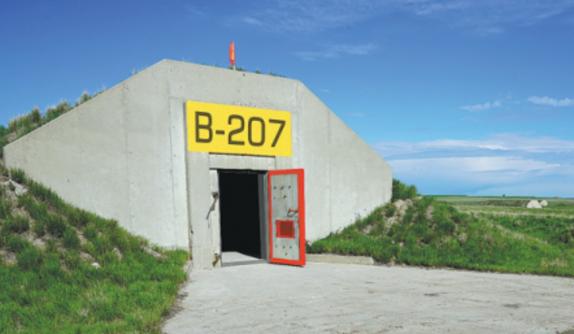 This undated photo shows a bunker provided by Vivos in the state of South Dakota, the United States. (PHOTO PROVIDED TO CHINA DAILY)
This undated photo shows a bunker provided by Vivos in the state of South Dakota, the United States. (PHOTO PROVIDED TO CHINA DAILY)
Scores of people in the United States are seeking underground bunkers as a survival solution due to fears of the coronavirus pandemic, wildfires, or possible civil unrest following the hotly contested presidential election, according to bunker dealers and builders.
Companies that lease or sell the bunkers can be found across the country.
They include Northeast Bunkers in Pittsfield, Maine; Hardened Structures in Virginia Beach, Virginia; Atlas Survival Shelters in Sulphur Springs, Texas; Rising S in Murchison, Texas; and Vivos in San Diego, California.
They say sales and inquiries are surging this year, especially because of the pandemic.
Even wealthy Silicon Valley moguls have bought luxury underground bunkers and have hired emergency medical and rescue experts in the event they will need them, a recent Financial Times article said.
Spending on shelters has increased since the coronavirus began dominating headlines recently, said bunker contractors Rising S, Atlas Survival Shelters and others.
Both Texas-based companies said inquiries and sales have risen, while Rising S said the number of new contracts signed in roughly the past three weeks has more than doubled.
Frank Woodworth, owner of Northeast Bunkers, which specializes in the design and construction of underground bunkers, told The New York Times that since the coronavirus outbreak, he could not keep up with demand, with inquiries coming from across the US as well as worldwide.
He said about two-thirds of his business comes from consumers who pay approximately US$25,000 for an underground, habitable dwelling.
Buyers say they simply want to protect their families from an increasingly turbulent world, according to Woodworth, who added that for many, the decision to build a bunker was made even before the pandemic and they now feel prepared for the next local or global crisis.
ALSO READ: COVID-19 cases near 10 million in US with no slowdown in sight
Dante Vicino, executive director of underground shelter company Vivos, said he received "a ton of" phone calls every day, from liberals and conservatives alike, following the Nov 3 presidential election.
Civil unrest and social discord are the two factors that we have noticed a lot of them citing as their reason to seek a bunker.
Dante Vicino, executive director of underground shelter company Vivos
Diverse concerns
People seeking a shelter have diverse concerns, such as "major Earth changes, climate change, national and global politics", Vicino said.
"Civil unrest and social discord are the two factors that we have noticed a lot of them citing as their reason to seek a bunker."
Vicino said his company builds affordable as well as luxury shelters for middle-class customers and high net worth individuals. Sales are up more than 400 percent and growing "exponentially", with inquiries and applications up over 1,000 percent compared with last year, he added.
Vicino is also founder of the Vivos xPoint settlement in the Black Hills area in the state of South Dakota. It is located at a former Army munitions base where there are 575 concrete fortresses, each half-built into thick grassland and roofed with soil.
He is selling an empty concrete shell of about 205 square meters for US$35,000. He said about 50 of the 575 have been sold so far, and 12 to 15 families are living there.
Separately, Atlas Survival Shelters ships and installs them worldwide. Its 3-meter-by-4-meter mini unit retails for about US$50,000, and owner Ron Hubbard said he sells "a few bunkers every week".
The number of people in the United States preparing for a crisis has tripled in the past nine years, said Bradley Garrett, an ethnographer at University College Dublin in Ireland and author of the recently published book Bunker: Building for the End Times.
"We now have much more accurate data through the work of Chris Ellis at Cornell University. Based on FEMA (the US Federal Emergency Management Agency) survey data, Ellis estimates that 11.4 million Americans are now preparing on some level," Garrett said.
READ MORE: Shares slide, dollar up as hopes of economic recovery fade
Contact the writer at liazhu@chinadailyusa.com


